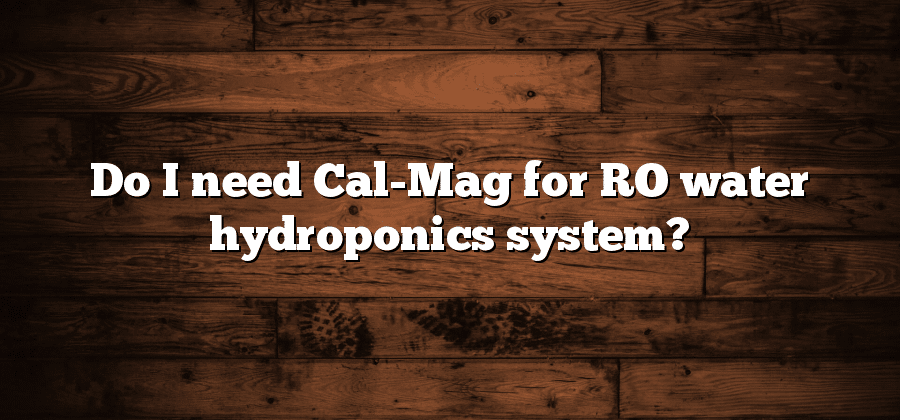Understanding the Role of Cal-Mag in Hydroponics
Calcium and magnesium, commonly referred to as cal-mag, are essential nutrients for plants in hydroponics systems. These elements play a crucial role in plant growth and development by providing structural support, facilitating enzymatic reactions, and regulating various physiological processes.
First and foremost, calcium is a critical nutrient that provides structural support to the cell walls of plants. It promotes strong and healthy cell walls, ensuring that the plants can withstand external pressures and environmental stresses. Additionally, calcium is involved in cell division and growth, helping plants develop robust stems, roots, and leaves. In the absence of sufficient calcium, plants may exhibit stunted growth, weakened structures, and heightened susceptibility to diseases and pests.
Alongside calcium, magnesium is another essential nutrient that plays a vital role in hydroponics. Magnesium is a central component of chlorophyll, the pigment responsible for the plant’s green coloration and its ability to carry out photosynthesis. This process converts light energy into chemical energy, allowing plants to synthesize carbohydrates and other vital organic compounds necessary for growth and reproduction. Adequate magnesium levels not only ensure vibrant leaf coloration but also enhance overall photosynthetic efficiency, leading to increased plant vigor and yield.
In conclusion, cal-mag is of utmost importance in hydroponics systems. Calcium and magnesium contribute to plant growth and development in various ways, including providing structural support, facilitating enzymatic reactions, and promoting photosynthetic efficiency. By understanding the role of cal-mag, hydroponic growers can optimize nutrient levels and achieve healthier, more productive plants.
The Impact of RO Water on Hydroponic Nutrient Levels
RO water, or reverse osmosis water, is commonly used in hydroponics systems as a way to ensure water purity and prevent the introduction of contaminants. While RO water is prized for its cleanliness, it can have a significant impact on the nutrient levels in hydroponic setups.
One of the primary effects of using RO water in hydroponics is its ability to strip away essential minerals and trace elements. This is because the reverse osmosis process filters out not only impurities but also essential nutrients necessary for plant growth. As a result, hydroponic gardeners often find that using RO water alone can lead to nutrient deficiencies, hindering plant development and overall productivity. Understanding and addressing the impact of RO water on nutrient levels is therefore crucial for successful hydroponic gardening.
Common Nutrient Deficiencies in RO Water Hydroponics
Balancing nutrient levels is crucial for the success of hydroponics systems that use reverse osmosis (RO) water. However, there are common nutrient deficiencies that can occur in RO water hydroponics. One common deficiency is calcium, which is vital for the development and strength of plant cell walls. When calcium levels are low, plants may exhibit symptoms such as stunted growth, yellowing leaves, and blossom end rot in fruits.
Another common nutrient deficiency in RO water hydroponics is magnesium. Magnesium plays a key role in chlorophyll production and helps in the activation of enzymes that are essential for various metabolic processes in plants. Without enough magnesium, leaves might turn yellow between the veins, and plants can show signs of weak growth and poor fruit production. It is important for hydroponic growers to be aware of these deficiencies and take proactive measures to address them in order to maintain optimal plant health and yield.
How Cal-Mag Supplements Address Nutrient Imbalances
Calcium and magnesium (Cal-Mag) supplements play a crucial role in addressing nutrient imbalances in hydroponic systems. As hydroponic solutions typically lack sufficient levels of these essential elements, it becomes essential to supplement them to ensure optimal plant growth. Calcium is essential for root development, cell structure, and nutrient uptake, while magnesium is required for chlorophyll production and enzyme activation.
When nutrient imbalances occur, plants may exhibit signs of deficiency or toxicity, impacting their overall health and productivity. Calcium deficiency may manifest as blossom end rot in fruits or tip burn in leafy greens, while magnesium deficiency may lead to yellowing between leaf veins. By providing Cal-Mag supplements, growers can restore the balance of these elements in the hydroponic system, helping plants thrive and reach their full potential.
Not only do Cal-Mag supplements address nutrient imbalances, but they also aid in maintaining pH stability in hydroponic systems. Calcium and magnesium play a crucial role in buffering the pH levels of the nutrient solution, preventing drastic fluctuations that can harm plant health. This ability to stabilize pH ensures that essential nutrients are readily available to the plants, promoting healthy growth and development. Additionally, the presence of Cal-Mag supplements helps improve nutrient uptake efficiency, allowing plants to absorb beneficial elements more effectively and reducing the likelihood of further imbalances.
Benefits of Using Cal-Mag in RO Water Hydroponics Systems
Cal-Mag supplements play a crucial role in addressing nutrient imbalances in hydroponic systems that use RO water. RO water, while purified, lacks essential minerals, including calcium (Ca) and magnesium (Mg), which are vital for plant growth. These deficiencies can lead to stunted growth, reduced yields, and overall poor health of the plants.
By adding Cal-Mag supplements to RO water hydroponic systems, growers can ensure that their plants have access to an optimal balance of calcium and magnesium. Calcium is essential for the development of strong cell walls, proper enzyme function, and nutrient absorption. On the other hand, magnesium is involved in chlorophyll production, which is necessary for photosynthesis and energy production. By providing these essential nutrients, Cal-Mag supplements promote healthy plant development, enhance nutrient availability, and ultimately improve overall crop quality and yield in hydroponic systems using RO water.






